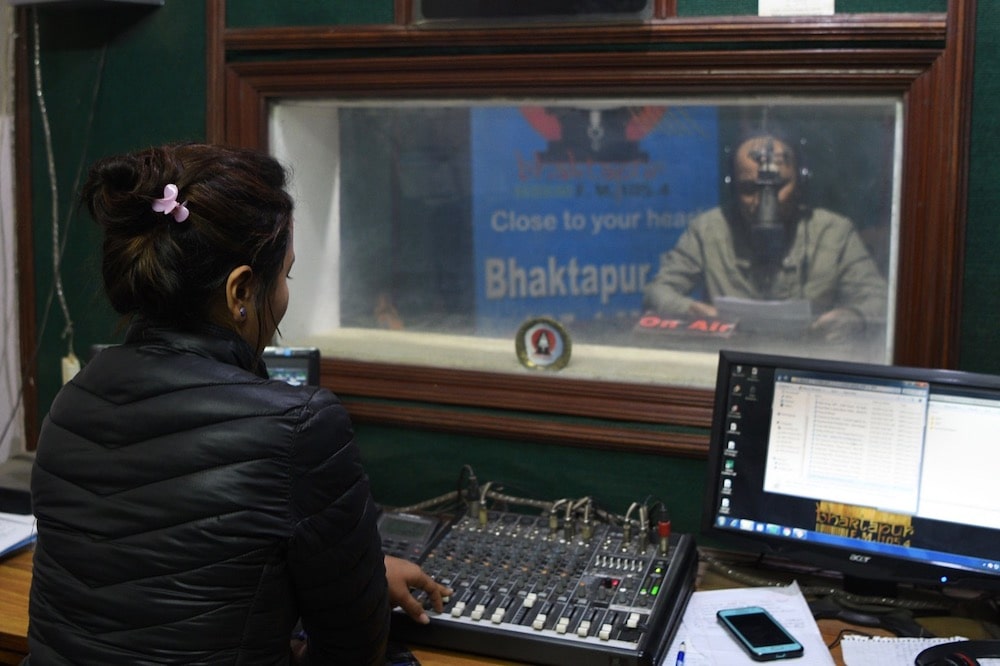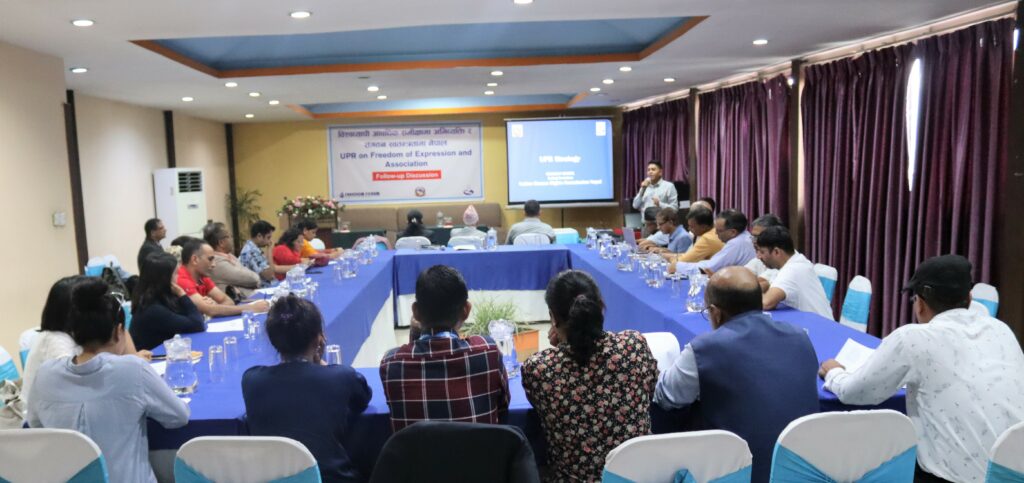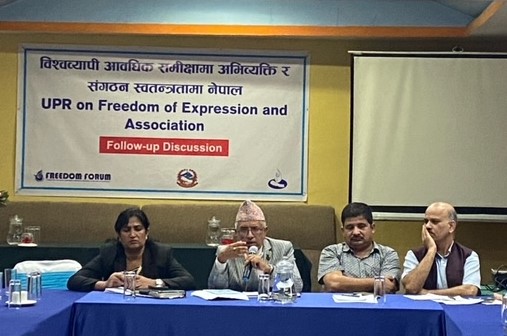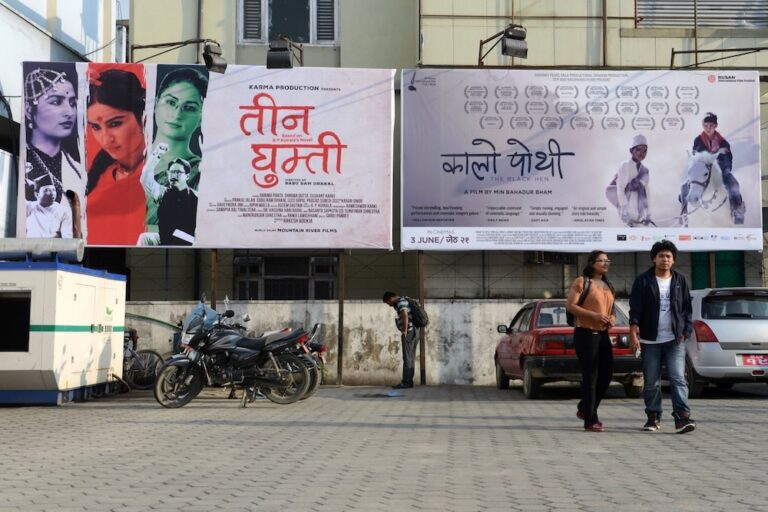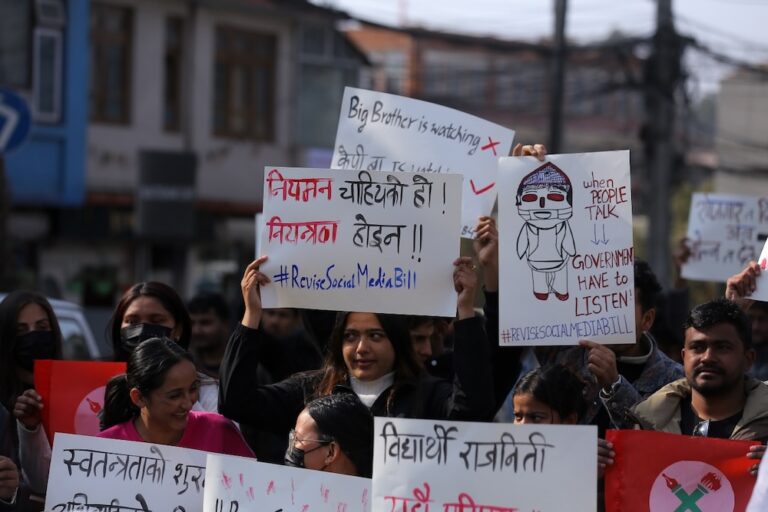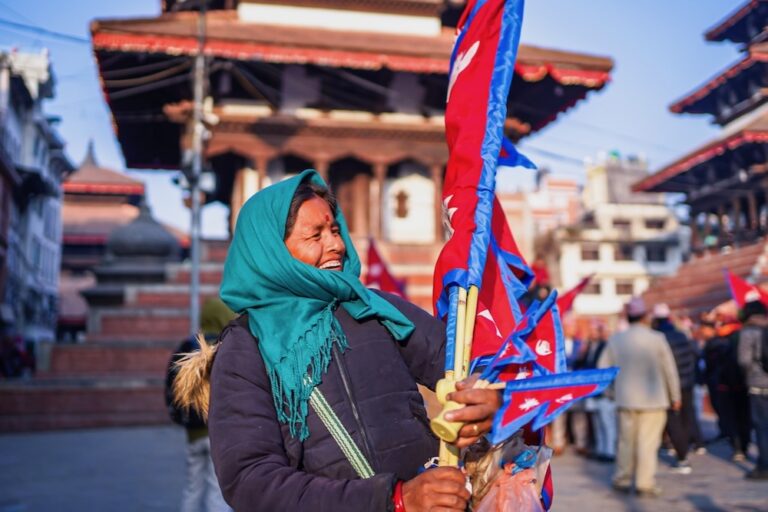During the 3rd UPR Cycle, Nepal received 233 recommendations, accepted 196 recommendations, and noted 37 recommendations.
This statement was originally published on freedomforum.org.np on 15 August 2023.
Freedom Forum organized a follow-up discussion on the Universal Periodic Review (UPR) on Freedom of Expression and Association, in collaboration with the National Human Rights Commission (NHRC) in the federal capital, Kathmandu, on August 11.
The discussion focused on the 3rd Cycle of the UPR. The UPR is an innovative process of the UN Human Rights Council, where the human rights situation of 193 UN member countries is evaluated, and declarations and commitments are made regarding the protection of human rights.
The event was held in the wake of the mid-term of the 3rd Cycle of the UPR for Nepal, with the participation of 35 persons, including 11 women, representing human rights institutions, media, and the Nepal Bar Association, among others.
Human Rights Official at the NHRC Khima Nanda Basyal started the program, highlighting its objective. He said the NHRC had always submitted the UPR on the entire human rights issues. The program’s aim was to discuss the current status of the implementation of recommendations to Nepal on human rights and the way forward for the preparation of the fourth cycle, especially on FoE and FoA.
Secretary at NHRC Murari Prasad Kharel made extensive presentations on the UPR process, UN member countries’ recommendations to the Nepal government in all three cycles and Nepal’s responses so far. This is an important moment to discuss the UPR in the wake of its mid-term, he underscored.
“The UPR has focused on rights of human right defenders as well. But the government is trying to shrink the civic space instead,” he noted. He also expressed the need for adopting an integrated approach to implement and monitor all 233 recommendations in cross-cutting issues. He also shared a joint action plan (how NHRC and CSOs could work together) on monitoring and evaluation of the implementation.
Following Kharel’s presentation, Mr Narayan Ghimire made a presentation on FF’s UPR submissions – focused on the themes of Freedom of Expression, and Freedom of Association and Assembly – in all three cycles. The recommendations made by 98 countries to the Nepal government on these themes were highlighted in the presentation. FF had prepared and submitted UPR reports on freedom of expression and association prepared in collaboration with Free Press Unlimited and CIVICUS.
It was shared that during the 3rd Cycle, Nepal received 233 recommendations and accepted/supported 196 recommendations and noted 37 recommendations.
In his presentation, Ghimire mentioned that most of the recommendations to Nepal on FoE and FoA were supported by the government and only a few were noted. One among the recommendations regarding an amendment of the Electronic Transaction Act (recommendation by USA) in line with citizens’ right to free speech right was ‘noted’ by the Nepal government.
After these important presentations, the floor was opened for discussion on those recommendations and participants’ observation on their implementation.
Columnist and noted investigative journalist Namrata Sharma warned that if all sides concerned do not raise their voice on any issue of public concern on time, the State would gradually slide to tyranny. Bringing forth the reference of India and how journalists and civic thinkers were censured, Ms Sharma stressed that critical thoughts and public opinions are essential to a healthy democracy, while she insisted, urging all to stay aware in this regard.
Mass media and journalism educator at Tribhuvan University, Shreeram Paudel, viewed media pluralism should be ensured in Nepal. He also referred to the honest implementation of the right to information (RTI).
Senior official at NHRC, Shyam Babu Kafle, wondered why the mechanism to implement the UPR implementation was still uncertain. He suggested Freedom Forum take a lead in advancing freedom of expression and the rights of FoE defenders by creating a national network on this.
Executive Director at SAP Nepal, Narendra Joshi, expressed the view that it was worrying to hear about the shrinking civic space in Nepal. Old laws must be replaced and some amended to fit changed conditions, so that civil society can work in an unrestricted manner.
Media Action Nepal’s Chairman Laxman Datt Pant suggested that the suppression of FoE online is a serious issue and it should also be addressed in the UPR process. A safe online space is the need of the hour, he argued, expressing that attacks on online space were growing lately in Nepal.
Ms Sadikchhya Silwal from Digital Rights Nepal expressed concern that despite such criticism from rights defenders, the recent National Cyber Security Policy government still warrants attention. She doubted that FoE is well protected in the policy.
Moreover, Ms Neha Gauchan from Body and Data underscored that FoE of the minority communities should also be addressed well. “In present time, not only the government but also tech companies breach freedom of expression and privacy,” she opined.
In response to the comments of participants, Acting Chairperson of NHRC, Surya Dhungel, stated that the NHRC was always ready to cooperate and collaborate with civil society to protect and promote human rights in the country. Avoiding responsibilities by the government on human rights obligations is a worrying factor, so lawmakers and parliamentarians must be made further accountable. Focused discussions are needed on multifarious issues relating to the UPR, Dhungel suggested.
Similarly, the General Secretary of the Nepal Bar Association, Anjita Khanal, expressed the view that the Nepal Bar Association is always ready to protect and promote human rights. She urged the stakeholders to make integrated efforts in advocating and realizing human rights.
FNJ President Bipul Pokhrel said the protection and promotion of freedom of expression is essential also for achieving SDGs. UPR is a significant platform to whet debate on human rights, including FoE (freedom of expression) and FoA (freedom of assembly and association), he added.
Moreover, Freedom Forum Executive Chief Taranath Dahal reminded everyone of the UPR process and said he believed that constructive discussion on different issues of human rights and the UPR would help create an atmosphere favourable for the exercise of human rights, including FoE and FoA. He also referred to the mid-term review of the UPR third cycle. UPR is such an effective global platform that facilitates discussion on human rights issues and makes governments accountable on these fronts.
“Time has come to ask government how and when it will prepare the mid-term report on the UPR 3rd cycle and how it responds to the recommendations it supported and noted,” he commented, saying that the present discussion is organized in the correct moment, because it is mid-term for the review of the UPR 3rd Cycle.
According to him, there was only slight reform in the recent National Cyber Security Policy. It needs further reform, Dahal added.
Concluding the discussion, FF’s Chairperson Hari Binod Adhikari appreciated the NHRC initiative for collaboration with FF on fostering debate on such important issues of the UPR. FoE is a base of other freedoms, hence we must continue our initiatives to promote and protect human rights and FoE by making government responsible on UPR issues, he argued.
In the 3rd Cycle of the UPR, a dozen recommendations were made by various countries to the Nepal government on FoE and FoA.
Some of them are:
Brazil: Consider revising the local legislation on media and information technology in order to guarantee the full respect of the right to freedom of opinion and expression. (Nepal had supported this)
Canada: Uphold respect for freedom of expression and the right to privacy, including in draft legislation regulating information technology, media and mass communications. (Nepal had supported this)
Chechia: Safeguard the freedom of expression and foster civil society participation; ensure that NGOs active in the field of human rights – including those receiving foreign grants – are free to operate. (Nepal had supported it)
USA: Reform the Electronic Transactions Act to eliminate the criminalization of speech. (Nepal had noted this)
Estonia: Ensure the right to freedom of expression online and offline, in law and in practice, and guarantee a safe and enabling environment for journalists and human rights defenders (Nepal had supported this)
Under the 3rd Cycle of UPR, the Nepal government (Foreign Minister Pradeep Gyawali) had submitted its UPR early in January 2021.
Meanwhile, on October 2021, the Office of the UN High Commissioner for Human Rights had written to Nepal’s Foreign Minister, Dr Narayan Khadka, reminding him of the following points under ‘Fundamental Freedoms.’
- To revise the draft of National Integrity/Ethics Policy
- To revise Draft Privacy Policy
- To revise draft Online Media Directive
- To Amend Electronic Transaction Act
- To Amend National Broadcasting Regulations
- To Decriminalize defamation and place it within a Civil Code to meet international standards
Moreover, under the joint UPR submission on FoE by Freedom Forum and Free Press Unlimited, the following recommendations were made to the Nepal government:
- Intensify the process to implement the directive brought at the National Human Rights Commission (NHRC) in order for the protection of human rights of journalists and rights defenders. The mechanism on safety of Freedom of Expression defenders, including journalists, should ensure the representation of Freedom of Expression experts, security personnel, concerned Ministry representatives and NHRC officials.
- Actively enhance and build capacity of the transitional justice mechanisms (TRC and CIEDP) with sufficient human and financial resources and legal and political support.
- Amend the legal framework of the TRC and CIEDP to make it consistent with international human rights law and Supreme Court of Nepal rulings.
- Set a baseline, indicators and targets by developing a monitoring mechanism to monitor government actions contributing to SDG indicators 16. 10 1. and 16.10.2 and set up a multi-stakeholder body assigned to critically assess government actions towards this end.
- Ensure stakeholder participation in media policy development and law making that contribute to SDG goal 16.10. 57.
- Amend RTI Act to
- Ensure Right to Information to all people by broadening its scope beyond citizens
- Devise institutional and legal mechanism at provincial and local governments to implement right to information
- Ensure information sharing/disclosure in open data format
- The government of Nepal should transform the government owned media to a public service media, while ensuring editorial independence.
- Adopt comprehensive national legislation in order to ensure media pluralism and protect independent media
- Investigate and stop state-sponsored trolling and cyber-bullying against journalists and dissenting voices
Under the 3rd Cycle, the joint UPR submission by Freedom Forum and CIVICUS on FoA made the following recommendation to Nepal government:
- Take measures to foster a safe, respectful and enabling environment for civil society, including by removing legal and policy measures that unwarrantedly limit the right to association.
- Remove all undue restrictions on the ability of CSOs to receive international and domestic funding in line with the best practices articulated by the UN Special Rapporteur on the rights to freedom of peaceful assembly and of association.
- Undertake a full consultation with all concerned stakeholders on the proposed law regulating ‘social organisations’, and the proposed National Integrity Policy, and guarantee that when enacted, undue restrictions on the freedom of association are removed
- Compliance with articles 21 and 22 of the ICCPR.
- Guarantee the effective and independent functioning of autonomous trade unions by ratifying ILO Convention No. 87.
- Adopt best practices on the freedom of peaceful assembly, as put forward by the UN Special Rapporteur on the rights to freedom of peaceful assembly and of association in his 2012 annual report, which calls for procedures in which there is simple notification of assemblies being held, rather than explicit permission being needed to assemble.
- Unconditionally and immediately release all protesters, HRDs and journalists detained for exercising their right to the freedom of peaceful assembly and review their cases to prevent further harassment.
- Immediately and impartially investigate all instances of extrajudicial killing and excessive force committed by security forces while monitoring protests.
It is worth noting that Freedom Forum, along with IFEX, had submitted joint UPR on FoE in the 1st Cycle, 2011; and along with ARTICLE 19 on FoE in the 2nd Cycle in 2015.
